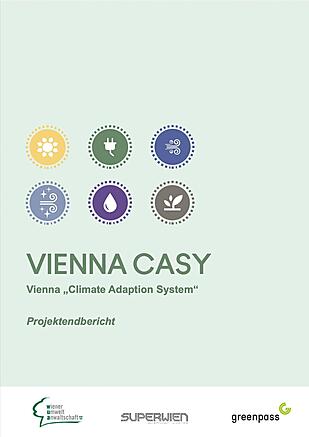Vienna CASY (Climate Adaptation System) stands for the Viennese Climate Change Adaptation System and includes effective climate indicators for planning processes for climate-friendly urban development
Vienna CASY (Climate Adaptation System) stands for the Viennese Climate Change Adaptation System and includes effective climate indicators for planning processes for climate-friendly urban development


Livable and climate-resilient cities
What is new and innovative about this project is the linking of climate indicators, i.e. parameters that describe the microclimate or the water balance, for example, with urban development planning processes. The aim is to provide guidance for the selection of suitable climate indicators for the individual planning steps with regard to project type, scale, location and position in the planning process in order to enable the most effective possible adaptation to climate change in urban development and architectural projects with the least possible effort.

The Vienna CASY project was submitted and funded in 2021 in Call No. 2 of the Innovation Management of the City of Vienna (Economy, Labour and Statistics - MA 23) by the Vienna Ombuds Office for Environmental Protection and numerous partners, including the University of Natural Resources and Life Sciences Vienna, GeoSphere Austria,superwien and greenpass.
Meaningful climate indicators
The climate indicators identified in Vienna CASY can be categorised into direct and indirect indicators. They were evaluated in terms of calculation effort, informative value, reliability and effectiveness in order to enable a well-founded selection for various planning phases. The most important indicators have an impact on the following areas:

- Thermal comfort: Influence on heat islands and quality of stay
- Energy balance: Reduction of heat absorption through greenery
- Air balance: Improvement of air circulation
- Cold airstream balance: Ensuring the supply of fresh air
- Water balance: Control of rainwater runoff
- Soil balance: Influence on infiltration and temperature regulation
Recommended climate indicator packages
Based on scientific analyses, recommendations were made for the optimal use of climate indicators in different planning phases. Overview graphics help planners to select suitable indicators in order to efficiently manage climate change-adapted measures. Particularly noteworthy are PET (Physiological Equivalent Temperature) heat maps for identifying heat islands and the thermal comfort value for evaluating measures.
Practical examples: Application in urban planning
- Neues Landgut (urban development): By using PET maps, heat-sensitive areas were identified and targeted measures were implemented, including additional tree planting, green roofs and façades and unsealing. These adjustments led to a measurable reduction in energy absorption and improved the thermal storage capacity of the area.
- Praterstern (public space): Here, tree planting and the expansion of green spaces increased thermal comfort. The runoff coefficient was lowered to allow more rainwater to seep away on site.
Conclusion: An effective tool for climate-adapted planning
Vienna CASY offers a scientifically sound assessment and management tool for the targeted integration of climate-relevant factors into planning processes. The application of the recommended climate indicators helps to develop climate-resilient urban neighbourhoods and sustainably improve the quality of life for the population. The report of the study is available for download below.


